Gardening for the Future - The Yard by Yard Project
by Lynne Robins, PhD
Volunteer, Pollinator Pathway NW
Finn Hill Homeowner
Finn Hill is a neighborhood in Kirkland, Washington. Read this account of how a community revised old ideas of what a yard should be and created thriving pollinator habitat one yard at a time.
I’ll be honest—sometimes I feel overwhelmed by the news about climate change, pollution,
and the loss of wildlife habitats. Since moving to Finn Hill in 1999, I’ve watched our
beautiful native trees and shrubs slowly disappear, replaced by lawns that need chemicals
and don’t support local wildlife. It’s easy to feel powerless. But I’ve learned that we can
make a difference—starting right in our own yards.
That’s why I helped launch the Yard by Yard Project—a community effort to restore Finn
Hill’s ecosystem one garden at a time. With support from King County Council, volunteers
from Pollinator Pathway Northwest and the Finn Hill Neighborhood Alliance are working
with homeowners to replace lawn with native plants that help capture and filter
stormwater, support pollinators and other wildlife, and add beauty to our neighborhood.
This isn’t just about gardening—it’s about healing the land, connecting with neighbors, and
creating a healthier future. Whether you have a big backyard or a small patch of land by the
sidewalk, your yard matters. Together, we can restore Finn Hill’s thriving habitat—yard by yard.
How the Project Got Started
Like many of you, I’ve often wondered what one person can really do to help the
environment. Then I discovered something hopeful: by simply changing how we garden, we can restore the health of our local ecosystem. Entomologist Douglas Tallamy’s research shows that homeowners can support nature by choosing to reduce lawn and plant native
species. Award winning landscaper Mary Reynolds says it best: “If you want to help nature,
you’re going to have to start with your own patch of it.”
With that in mind, I teamed up with Pollinator Pathway Northwest and the Finn Hill
Neighborhood Alliance to apply for a King County WaterWorks grant. Our idea was simple:
help neighbors learn how to garden in ways that protect our watershed, support wildlife,
and make our yards more beautiful and diverse.
Thanks to the grant, we launched the Yard by Yard Project. We selected 10 Finn Hill
homeowners from a pool of over 40 who were eager to participate. We prioritized teams of
neighbors whose yards were close together so their gardens could create a stronger habitat
corridor. Each yard was unique—some bordered sensitive natural areas, others were small
residential lots—but all had the potential to make a difference.
With help from Landscape Architect Page Crutcher, each homeowner chose a palette of
native plants that fit their yard’s conditions and personal style. Between December 2024
and May 2025, volunteers and project leaders planted over 1,400 native plants across
nearly 4,000 square feet of yard space.
What Neighbors Are Saying
One of the most rewarding parts of the Yard by Yard Project has been hearing from the
homeowners who participated. Their enthusiasm and gratitude remind us why this work
matters—not just for the environment, but for our community. Here are a few things neighbors shared:
“It’s been such a pleasure working with people who care about the
creatures living around us. I’m proud to be part of this project—I’ve
made new friends and gotten to know my neighbors better.”
“I’m so grateful for this grant and for all your work. It’s changing the landscape one yard at a time and inspiring others through conversation. I can’t wait to put up a sign in my yard!”
“This has been an awesome experience. I hope you’re happy with the results everywhere—we sure are!”
“I’m so grateful for this grant and for all your work. It’s changing the landscape one yard at a time and inspiring others through conversation. I can’t wait to put up a sign in my yard!”
“This has been an awesome experience. I hope you’re happy with the results everywhere—we sure are!”
These gardens aren’t just protecting our watershed and helping pollinators —they’re
sparking conversations, building connections, and bringing neighbors together around a
shared purpose.
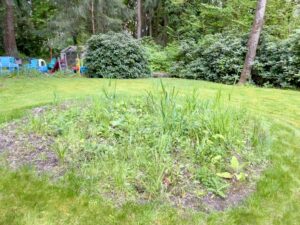
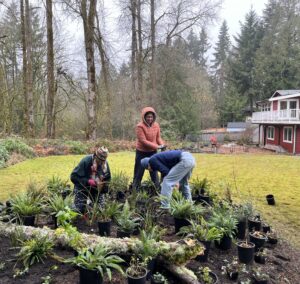
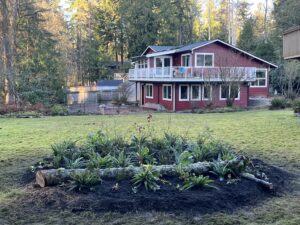
Checking in on the Gardens
In September 2025, our team visited each of the newly planted gardens to see how they
were doing after the summer drought. We were thrilled to find that the plants looked
surprisingly healthy—proof that native species are well adapted to our local climate and
can thrive with minimal watering.
We’ll continue to check in on these gardens to see how they grow and change over time.
We’re also excited to be partnering with Veronica Cassone McGowan, Ph.D. and Ash Putzke
from UW Bothell to plant additional gardens and gather data on how these small changes
can make a big impact on our watershed and local wildlife.
Every yard we transform is a step toward a healthier, more connected ecosystem—and
we’re just getting started.
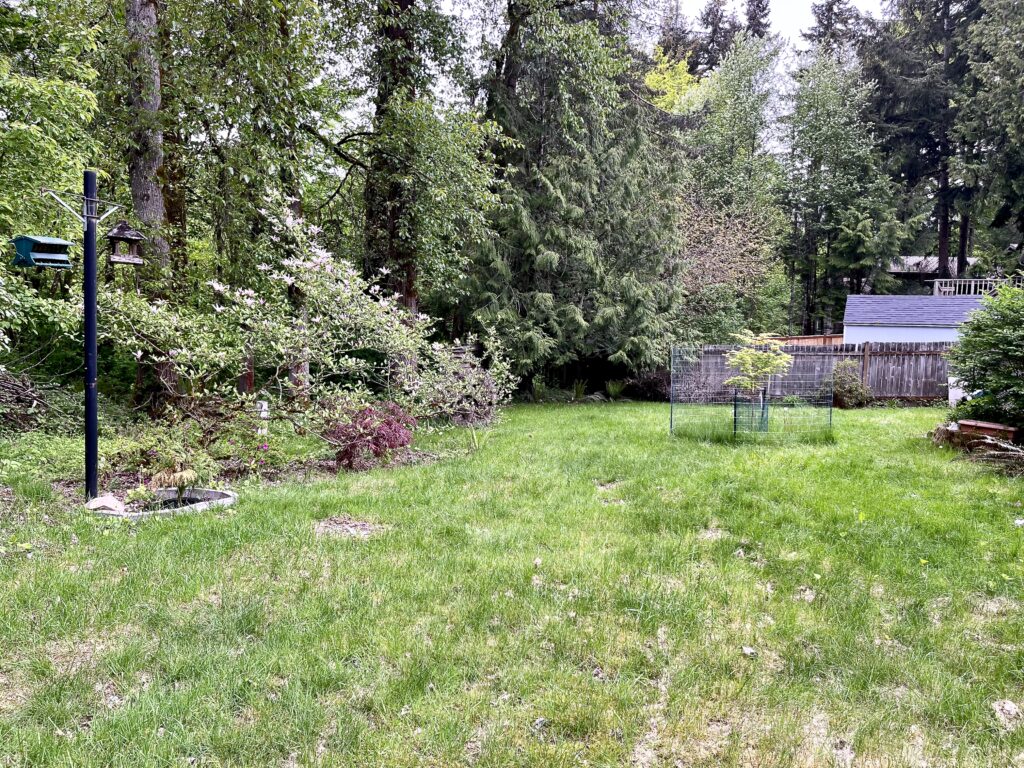
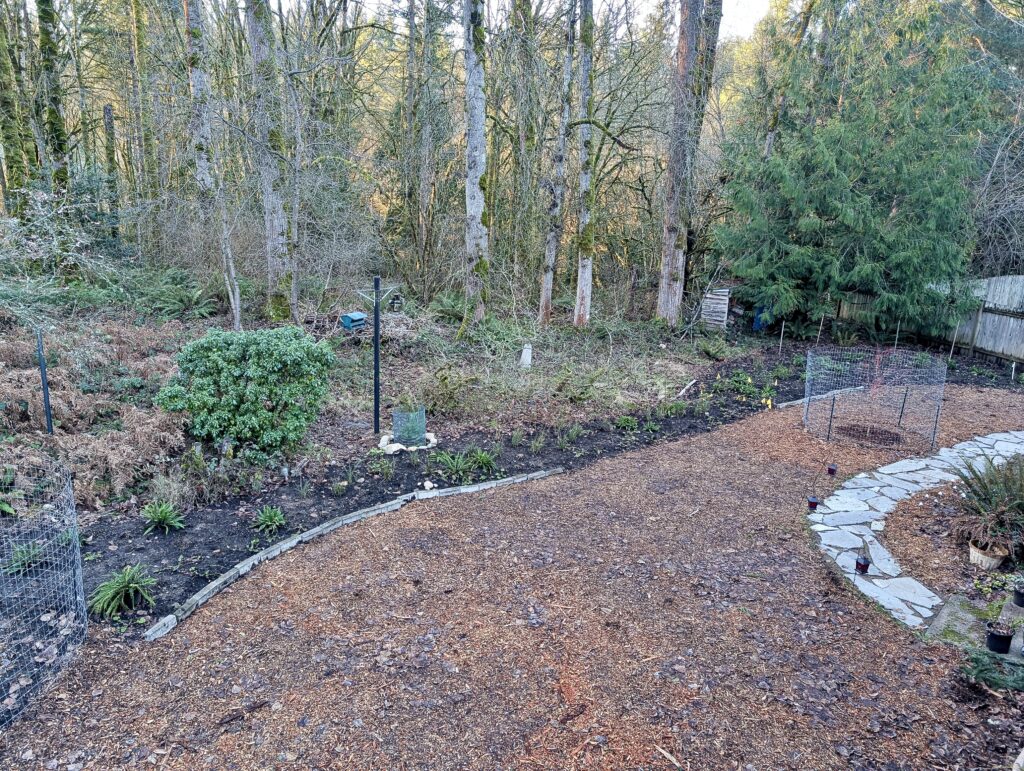
Let's Grow Something Beautiful - Together
Every yard has the power to make a difference. By planting native species, reducing lawn,
and caring for the land beneath our feet, we’re not just gardening—we’re restoring habitat,
protecting our watershed, and building a stronger, more connected community.
This project has shown that small changes, when made together, can lead to big results. It’s
not about perfection—it’s about participation. Whether you’re an experienced gardener or
just starting out, your yard matters. Your choices matter. So, let’s keep growing. Let’s keep
learning. Let’s keep inviting nature back into our lives—yard by yard.
If you’re curious, inspired, or ready to dig in, we’d love to hear from you. Together, we can
turn Finn Hill into a thriving ecosystem of hope, habitat, and beauty. Contact Lynne at lynne@finnhill.org or visit the Finn Hill Neighborhood Alliance website.
